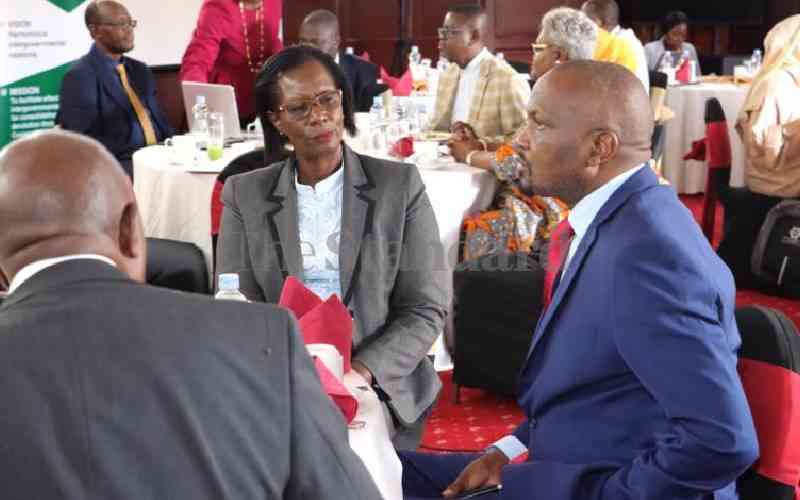A recent visit to farmers in Tharaka Nithi County made me question whether we are paying a fair price for the food we consume.
During a community meeting, I asked smallholder farmers about the price of green grams, and one of them, a Mr Njoka mentioned Sh65 per kilo.
To my surprise, supermarkets sell it for Sh205, creating a Sh140 difference. This discrepancy was highlighted in a recent skit by social media comedian Jackie ‘Awinja’ Vike, where she humorously depicted urban residents, especially Nairobians, as unaware of the true cost of the food they eat.
Awinja’s concerns are valid for nearly every region of Africa, where urban residents often overlook or disregard the true cost of food, accustomed to acquiring it inexpensively or as gifts from relatives in rural areas. Yet this should not be the case as it leaves agricultural producers more impoverished with each passing season.
And with the economic situation getting tougher for everybody, it goes without saying that we must now start prioritising paying our farmers fairly, noting that they encounter numerous challenges during the production cycle. A better appreciation of food’s true cost can help those trying to provide healthy and affordable food for all consumers live more rewarding lives. It can also lead to better long-term decision making about fair, livable wages, and safe conditions for all workers while promoting innovation to deliver more viable farming options, especially in the rural areas. This is in addition to helping protect our planet.
For Modesto Kiambati, a farmer from Tharaka Nithi, who practises rain-fed agriculture, such considerations would radically transform his capacity to fund his children’s education and support his aging parents.
For now, the measly prices he gets for every kilo he produces cannot sufficiently cover his daily expenses, let alone the rising production costs, including tilling, seeds, weeding, fertiliser, harvesting, shredding and storage. For the welfare of people like Kiambati and Njoka, it is crucial that we ramp up our willingness to pay the true cost of food all the time, acknowledging the hefty expenditure that farmers face. Such actions will not only preserve the livelihoods of those who feed the world but also prepare ground for sustainable agriculture.
But, of course, we must recognise that for us to reach the point where we can proudly say we pay the true cost of food, we must work with numbers. We must accurately calculate the full cost we pay for food today to successfully shape economic and regulatory incentives tomorrow. By quantifying the annual, true cost of food, the Alliance for a Green Revolution in Africa (AGRA) has taken a critical but limited first step to educate the farmers and other food systems actors.
At the same time, it is worth noting that while it is critical to quantify the “true cost” of food to effectively address the impacts of the current food system, we should desist from trying to drive change by increasing consumer prices.
Indeed, there are alternative options for supporting the transformation: from redesigning nutrition programmes to dietary shifts, to adopting more resource-efficient business practices, to technological innovations to improve the nutritional value of products, to policy changes.
Any reshaping of the food system must also consider the long-standing, and systemic, inequities and burdens already carried by marginalised communities, including the millions of households currently experiencing nutrition insecurity. As such, we should look for ways to meaningfully address the “true cost of food” without necessarily raising consumer prices or adopting changes that exacerbate existing inequities in the food system.
We can take the cue from the developed world, including in countries like the United States, where the overall “true cost of food” is at least $3.2 trillion a year, and most of the externalised costs are absorbed by businesses, producers, consumers, and future generations.
For farmers in Tharaka Nithi and across Africa, empowerment to invest in sustainable practices, improve their farms, and enhance living conditions for their families, will in the long-term help them break free from the perpetual struggle caused by low prices.
 The Standard Group Plc is a multi-media organization with investments in media
platforms spanning newspaper print operations, television, radio broadcasting,
digital and online services. The Standard Group is recognized as a leading
multi-media house in Kenya with a key influence in matters of national and
international interest.
The Standard Group Plc is a multi-media organization with investments in media
platforms spanning newspaper print operations, television, radio broadcasting,
digital and online services. The Standard Group is recognized as a leading
multi-media house in Kenya with a key influence in matters of national and
international interest.
 The Standard Group Plc is a multi-media organization with investments in media
platforms spanning newspaper print operations, television, radio broadcasting,
digital and online services. The Standard Group is recognized as a leading
multi-media house in Kenya with a key influence in matters of national and
international interest.
The Standard Group Plc is a multi-media organization with investments in media
platforms spanning newspaper print operations, television, radio broadcasting,
digital and online services. The Standard Group is recognized as a leading
multi-media house in Kenya with a key influence in matters of national and
international interest.










